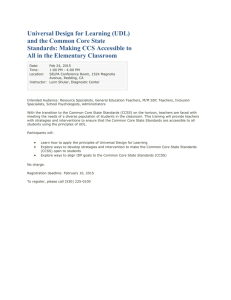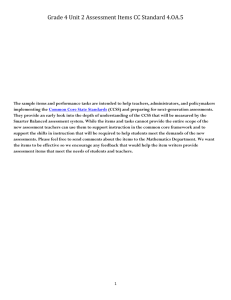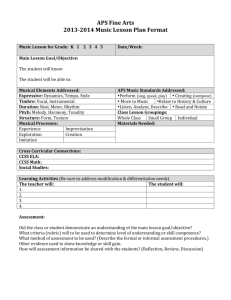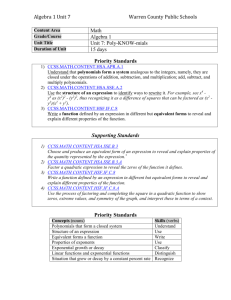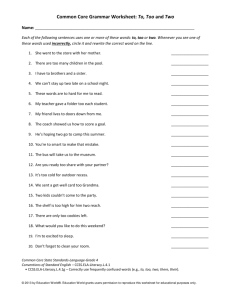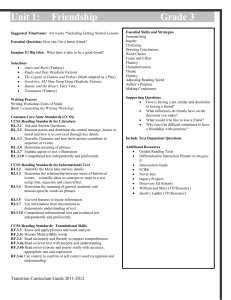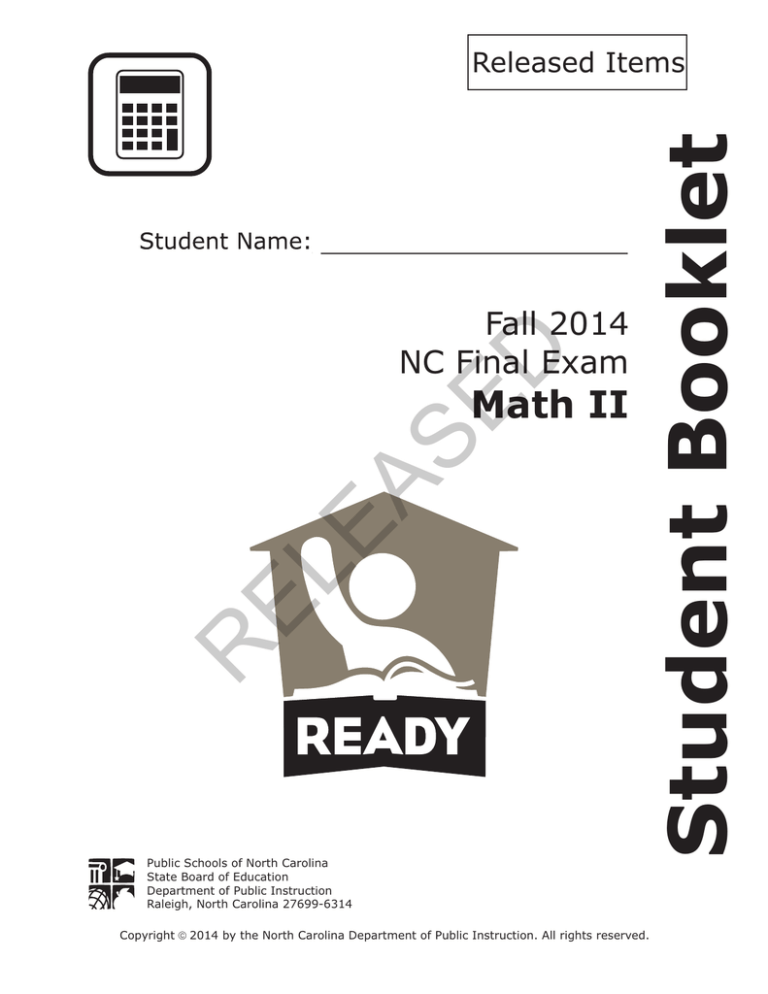
D
Fall 2014
NC Final Exam
R
EL
EA
SE
Math II
Public Schools of North Carolina
State Board of Education
Department of Public Instruction
Raleigh, North Carolina 27699-6314
Copyright ã 2014 by the North Carolina Department of Public Instruction. All rights reserved.
Student Booklet
Released Items
MATH II — RELEASED ITEMS
1
Which expression is equivalent to 8w x y z
7
5
3
9
2
3?
10
A
x 3 z6
14
4w 3 y 2
14
B
4w 3 y 2
10
x 3 z6
5
11
3
7
11
3
D
x 3z
5
D
7
x3z
SE
C
1
2w 3y 3
1
A marathon is roughly 26.2 miles long. Which equation could be used to determine
the time, t, it takes to run a marathon as a function of the average speed, s, of
the runner where t is in hours and s is in miles per hour?
t 26.2 26.2s
B
t 26.2
C
t 26.2s
D
t 26.2
s
EL
A
s
26.2
R
2
EA
2w 3y 3
1
Go to the next page.
MATH II — RELEASED ITEMS
5
6
B
7
C
8
D
9
D
A
1.7 Newtons
B
5.7 Newtons
C
11.9 Newtons
D
12.9 Newtons
EA
A
SE
The force, F, acting on a charged object varies inversely to the square of its
distance, r, from another charged object. When the two objects are 0.64 meter
apart, the force acting on them is 8.2 Newtons. Approximately how much force
would the object feel if it is at a distance of 0.77 meter from the other object?
EL
4
The time, t, in hours, that it takes x people to plant n trees varies directly with
the number of trees, and inversely with the number of people. Suppose 6 people
can plant 12 trees in 3 hours. How many people are needed to plant 28 trees in
5 hours and 15 minutes?
A system of equations is shown below.
R
3
y = x2 + 2x + 8
y = 4x
What is the smallest value of y in the solution set of the system?
A
4
B
2
C
8
D
16
2
Go to the next page.
MATH II — RELEASED ITEMS
6
The towers of a suspension bridge are 800 feet apart and rise 162 feet higher than
the road. Suppose that the cable between the towers has the shape of a parabola
and is 2 feet higher than the road at the point halfway between the towers.
SE
D
162 feet
800 feet
B
74 feet
C
22 feet
D
16 feet
EL
80 feet
Congruent squares, with side lengths of x, are cut from the corners of a
12-inch–by–16-inch piece of cardboard to form an open box. Which equation
models the surface area, y, of the open box after the corners are cut away?
R
7
A
EA
What is the approximate height of the cable 120 feet from either tower?
A
y = (16 – 2x)(12 – 2x)
B
y = (16 – 2x)(12 – 2x) + 4x2
C
y = 192 – 16x2
D
y = 192 – 4x2
3
Go to the next page.
MATH II — RELEASED ITEMS
8
The cost of a newspaper advertisement is a function of its size.
A company wants its advertisement to have a height that is twice its
width.
The newspaper charges a flat rate of $50 plus an additional $10 per
square inch.
The company can spend no more than $2,050 on the advertisement.
B
10 inches
C
15 inches
D
20 inches
EA
Which function is even?
SE
5 inches
f(x) = (x + 2)(x – 2)
B
f(x) = x(x + 2)
C
f(x) = (x + 1)(x – 2)
D
f(x) = (x – 1)(x – 1)
EL
A
R
9
A
D
What is the maximum height of an advertisement that the company can afford?
4
Go to the next page.
MATH II — RELEASED ITEMS
10
Farmer Brown built a rectangular pen for his chickens using 12 meters of fence.
He used part of one side of his barn as one length of the rectangular
pen.
He maximized the area using the 12 meters of fence.
Farmer Johnson built a rectangular pen for her chickens using 16 meters of fence.
She used part of one side of her barn as one length of the rectangular
pen.
The length of her pen was 2 meters more than the length of
Farmer Brown’s pen.
The width of her pen was 1 meter more than the width of
Farmer Brown’s pen.
SE
D
How much larger is Farmer Johnson’s rectangular pen than Farmer Brown’s?
B
18 square meters
C
16 square meters
D
14 square meters
EL
EA
24 square meters
The function f (x) 85 models the volume of a gas in a balloon under x units of
x
pressure at a constant temperature. Which best describes the domain of f(x)?
R
11
A
A
0 < x ≤ 85
B
0 ≤ x ≤ 85
C
x>0
D
x≥0
5
Go to the next page.
MATH II — RELEASED ITEMS
R(x) = x2 – x + 4
B
R(x) = 2x2 + 4x – 4
C
R(x) = 12x – 4
D
R(x) = 4x + 4
D
A
SE
Which rotation will carry a regular hexagon onto itself?
a 30° counterclockwise rotation
B
a 90° counterclockwise rotation
C
a 120° counterclockwise rotation
D
a 270° counterclockwise rotation
EA
A
EL
13
A rectangular rug is placed on a rectangular floor. The width of the floor is 4 feet
greater than the length, x, of the floor. The width of the rug is 2 feet less than the
width of the floor. The length of the rug is 4 feet less than the width of the rug.
Which function, R(x), represents the area of the floor not covered by the rug?
R
12
6
Go to the next page.
MATH II — RELEASED ITEMS
Kathleen rotated an isosceles trapezoid 360° around its longest base. Which choice
could be the resulting solid?
A
SE
D
B
EA
C
EL
D
R
14
7
Go to the next page.
MATH II — RELEASED ITEMS
A
The line that passes through F and G intersects the y-axis at (0, 5.5 + k).
B
The line that passes through F and G intersects the y-axis at (0, 5.5).
C
The line that passes through F and G has a slope of
k.
D
The line that passes through F and G has a slope of
3
.
4
D
3
4
SE
Triangle EGF is graphed below.
y
G
+6
+5
+4
EA
E
+3
+2
+1
–6 –5 –4 –3 –2 –1 0
–1
EL
16
FG has points F(2, 4) and G(6, 1). If FG is dilated with respect to the origin by a
factor of k, to produce F G , which statement must be true?
R
15
–2
–3
+1 +2 +3 +4 +5 +6
x
F
–4
–5
–6
Triangle EGF will be rotated 90° counterclockwise around the origin and will then
be reflected across the y-axis, producing an image triangle. Which additional
transformation will map the image triangle back onto the original triangle?
A
rotation 270° counterclockwise around the origin
B
rotation 180° counterclockwise around the origin
C
reflection across the line y = x
D
reflection across the line y = x
8
Go to the next page.
MATH II — RELEASED ITEMS
17
Suppose that Jamal can choose to get home from work by taxi or bus.
When he chooses to get home by taxi, he arrives home after 7 p.m.
8 percent of the time.
When he chooses to get home by bus, he arrives home after 7 p.m.
15 percent of the time.
Because the bus is cheaper, he uses the bus 60 percent of the time.
0.14
C
0.60
D
0.74
SE
B
EA
0.09
A total of 540 customers, who frequented an ice cream shop, responded to a
survey asking if they preferred chocolate or vanilla ice cream.
308 of the customers preferred chocolate ice cream.
263 of the customers were female.
152 of the customers were males who preferred vanilla ice cream.
EL
What is the probability that a customer chosen at random is a male or prefers
vanilla ice cream?
R
18
A
D
What is the approximate probability that Jamal chose to get home from work by
bus, given that he arrived home after 7 p.m.?
A
419
540
B
119
180
C
197
540
D
38
135
9
Go to the next page.
MATH II — RELEASED ITEMS
This is the end of the Math II Released Items.
Directions:
1. Look back over your answers for the test questions.
2. Make sure all your answers are entered on the answer sheet. Only what is
entered on your answer sheet will be scored.
3. Put all of your papers inside your test book and close the test book.
D
4. Place your calculator on top of the test book.
SE
5. Stay quietly in your seat until your teacher tells you that testing is
finished.
R
EL
EA
6. Remember, teachers are not allowed to discuss items from the test with
you, and you are not allowed to discuss with others any of the test
questions or information contained within the test.
10
MATH II — RELEASED ITEMS
Math II
RELEASED Items1
Fall 2014
Answer Key
Item Number
Type2
Key
1
MC
A
37%
CCSS.Math.Content.HSN.RN.A.2
2
MC
D
67%
CCSS.Math.Content.HSA.CED.A.2
3
MC
C
44%
CCSS.Math.Content.HSA.REI.A.2
4
MC
B
40%
5
MC
C
6
MC
A
7
MC
D
22%
CCSS.Math.Content.HSA.CED.A.2
8
MC
D
47%
CCSS.Math.Content.HSF.IF.C.8.A
D
Standard
SE
CCSS.Math.Content.HSA.REI.A.2
CCSS.Math.Content.HSA.REI.C.7
28%
CCSS.Math.Content.HSA.REI.B.4.B
EA
33%
MC
A
39%
CCSS.Math.Content.HSF.BF.B.3
MC
D
35%
CCSS.Math.Content.HSF.BF.A.1.B
R
10
EL
9
Percent Correct3
MC
C
18%
CCSS.Math.Content.HSF.IF.B.5
MC
D
17%
CCSS.Math.Content.HSF.BF.A.1.B
13
MC
C
31%
CCSS.Math.Content.HSG.CO.A.3
14
MC
C
28%
CCSS.Math.Content.HSG.GMD.B.4
15
MC
D
26%
CCSS.Math.Content.HSG.SRT.A.1.A
16
MC
D
23%
CCSS.Math.Content.HSG.CO.A.5
11
12
1
MATH II — RELEASED ITEMS
Item Number
Type2
Key
Percent Correct3
17
MC
D
20%
CCSS.Math.Content.HSS.CP.B.6
18
MC
B
20%
CCSS.Math.Content.HSS.CP.B.7
Standard
1
D
These released items were administered to students during a previous test administration. This
sample set of released items may not reflect the breadth of the standards assessed and/or the
range of item difficulty found on the NC Final Exam. Additional items may be reviewed at
http://www.ncpublicschools.org/accountability/common-exams/released-forms/. Additional
information about the NC Final Exam is available in the Assessment Specification for each exam
located at http://www.ncpublicschools.org/accountability/common-exams/specifications/.
2
SE
This NC Final Exam contains only multiple-choice (MC) items.
3
R
EL
EA
Percent correct is the percentage of students who answered the item correctly during the
Spring 2014 administration.
2
MATH II — RELEASED ITEMS
Standard Descriptions
Only standard descriptions addressed by the released items in this booklet are listed below.
A complete list of standards for English Language Arts and Mathematics may be reviewed at
http://www.corestandards.org/read-the-standards/.
CCSS.Math.Content.HSN.RN.A.2 (High School: Number and Quantity)
The Real Number System: Extend the properties of exponents to rational exponents.
Rewrite expressions involving radicals and rational exponents using the properties of exponents.
D
CCSS.Math.Content.HSA.CED.A.2 (High School: Algebra)
Creating Equations: Create equations that describe numbers or relationships.
Create equations in two or more variables to represent relationships between quantities; graph
equations on coordinate axes with labels and scales.
SE
CCSS.Math.Content.HSA.REI.A.2 (High School: Algebra)
Reasoning with Equations and Inequalities: Understand solving equations as a process of
reasoning and explain the reasoning. Solve simple rational and radical equations in one variable,
and give examples showing how extraneous solutions may arise.
EA
CCSS.Math.Content.HSA.REI.C.7 (High School: Algebra)
Reasoning with Equations and Inequalities: Solve systems of equations.
Solve a simple system consisting of a linear equation and a quadratic equation in two variables
algebraically and graphically. For example, find the points of intersection between the
line y = –3x and the circle x2 + y2 = 3.
R
EL
CCSS.Math.Content.HSA.REI.B.4.B (High School: Algebra)
Reasoning with Equations and Inequalities: Solve equations and inequalities in one variable.
Solve quadratic equations by inspection (e.g., for x2 = 49), taking square roots, completing the
square, the quadratic formula and factoring, as appropriate to the initial form of the equation.
Recognize when the quadratic formula gives complex solutions and write them as a ± bi for real
numbers a and b.
CCSS.Math.Content.HSF.IF.B.5 (High School: Functions)
Interpreting Functions: Interpret functions that arise in applications in terms of the context.
Relate the domain of a function to its graph and, where applicable, to the quantitative
relationship it describes. For example, if the function h(n) gives the number of person-hours it
takes to assemble n engines in a factory, then the positive integers would be an appropriate
domain for the function.
CCSS.Math.Content.HSF.IF.C.8.A (High School: Functions)
Interpreting Functions: Analyze functions using different representations. Write a function
defined by an expression in different but equivalent forms to reveal and explain different
properties of the function: Use the process of factoring and completing the square in a quadratic
function to show zeros, extreme values, and symmetry of the graph, and interpret these in
terms of a context.
3
MATH II — RELEASED ITEMS
CCSS.Math.Content.HSF.BF.B.3 (High School: Functions)
Building Functions: Build new functions from existing functions. Identify the effect on the graph
of replacing f(x) by f(x) + k, k f(x), f(kx), and f(x + k) for specific values of k (both positive and
negative); find the value of k given the graphs. Experiment with cases and illustrate an
explanation of the effects on the graph using technology. Include recognizing even and odd
functions from their graphs and algebraic expressions for them.
CCSS.Math.Content.HSF.BF.A.1.B (High School: Functions)
Building Functions: Build a function that models a relationship between two quantities. Write a
function that describes a relationship between two quantities: Combine standard function types
using arithmetic operations. For example, build a function that models the temperature of a
cooling body by adding a constant function to a decaying exponential, and relate these functions
to the model.
SE
D
CCSS.Math.Content.HSG.CO.A.3 (High School: Geometry)
Congruence: Experiment with transformations in the plane. Given a rectangle, parallelogram,
trapezoid, or regular polygon, describe the rotations and reflections that carry it onto itself.
EA
CCSS.Math.Content.HSG.CO.A.5 (High School: Geometry)
Congruence: Experiment with transformations in the plane:
Given a geometric figure and a rotation, reflection, or translation, draw the transformed figure
using, e.g., graph paper, tracing paper, or geometry software. Specify a sequence of
transformations that will carry a given figure onto another.
EL
CCSS.Math.Content.HSG.SRT.A.1.A (High School: Geometry)
Similarity, Right Triangles, and Trigonometry: Understand similarity in terms of similarity
transformations. Verify experimentally the properties of dilations given by a center and a scale
factor. A dilation takes a line not passing through the center of the dilation to a parallel line, and
leaves a line passing through the center unchanged.
R
CCSS.Math.Content.HSG.GMD.B.4 (High School: Geometry)
Geometric Measurement and Dimension: Visualize relationships between two-dimensional
and three-dimensional objects. Identify the shapes of two-dimensional cross-sections of
three-dimensional objects, and identify three-dimensional objects generated by rotations of
two-dimensional objects.
CCSS.Math.Content.HSS.CP.B.6 (High School: Statistics and Probability)
Conditional Probability and the Rules of Probability: Use the rules of probability to compute
probabilities of compound events. Find the conditional probability of A given B as the fraction of
B’s outcomes that also belong to A, and interpret the answer in terms of the model.
CCSS.Math.Content.HSS.CP.B.7 (Statistics and Probability)
Conditional Probability and the Rules of Probability: Use the rules of probability to compute
probabilities of compound events. Apply the Addition Rule, P(A or B) = P(A) + P(B) – P(A and B),
and interpret the answer in terms of the model.
4

